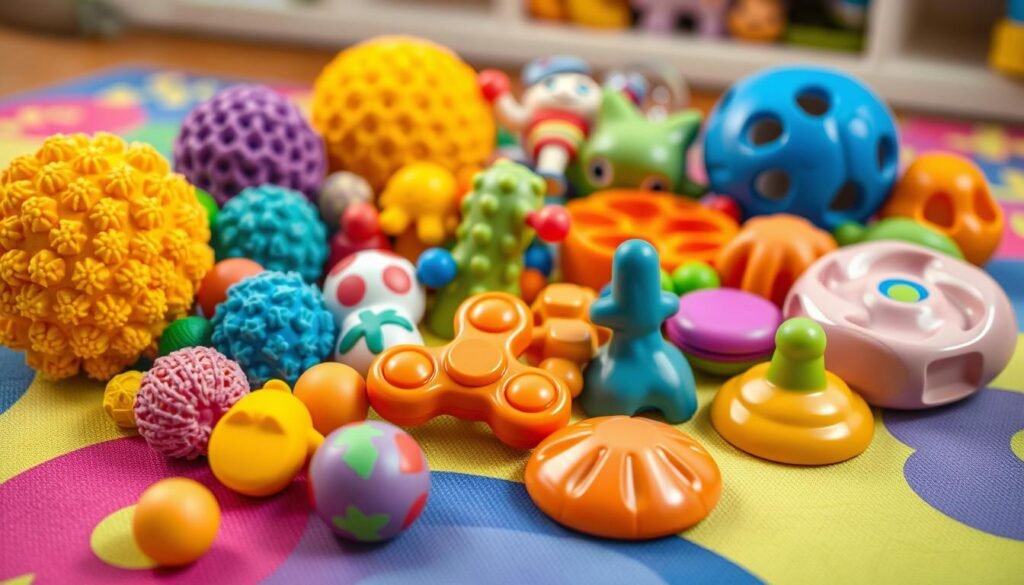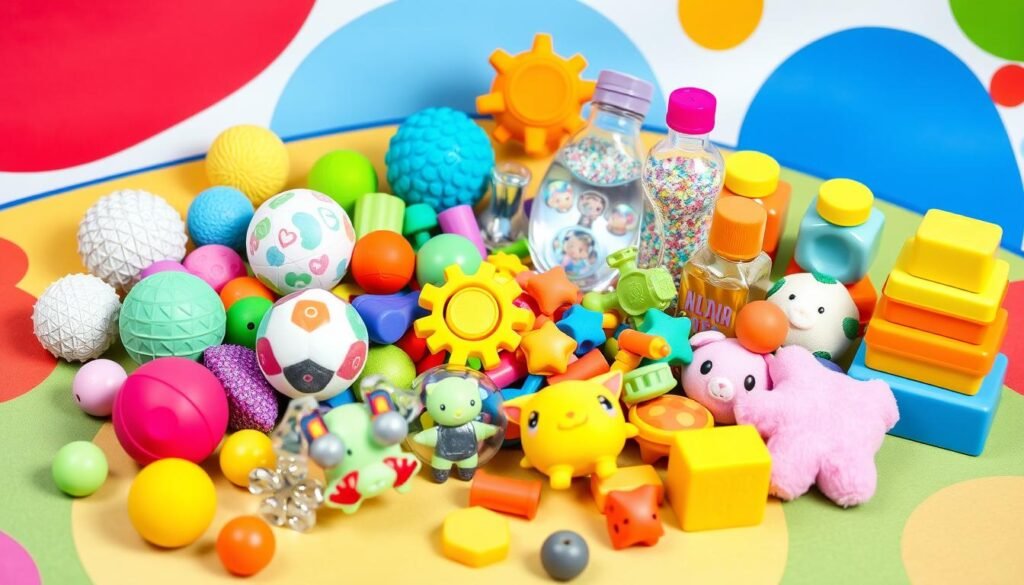Imagine a world where kids can explore their senses and grow through play. This is the world of sensory toys. In a classroom, a boy named Ethan is fascinated by a tactile toy. His fingers move over it, and his eyes sparkle with excitement. Sensory toys engage, stimulate, and empower kids, helping them discover and grow.
Sensory toys work on a child’s five senses: sight, sound, touch, smell, and taste. These interactive toys are more than just playthings. They are tools that deeply impact a child’s development. From improving fine motor skills to captivating young minds, sensory toys open up a world of possibilities for kids to explore and grow1.
Key Takeaways
- Sensory toys are designed to stimulate a child’s five senses: sight, sound, touch, smell, and taste.
- These toys can help children with autism and sensory processing difficulties by improving their focus, comprehension, and overall functioning ability.
- Sensory toys come in a wide variety, including white noise machines, scented pencils, and vibrating massagers, each catering to different sensory needs.
- Sensory toys can help children stay calm, develop motor skills, enhance visual perception, and regulate their sensory experiences.
- The range of sensory toys available covers diverse options, from fidget toys to STEM building toys, to cater to different sensory needs and preferences.
Understanding Sensory Issues in Children with Autism
Children with autism face special challenges with their senses. They might be too sensitive (hypersensitive) or not sensitive enough (hyposensitive) to different things2. Toddlers with these issues might not like loud noises or bright lights. They might also feel uncomfortable with certain clothes2.
These kids might act out in extreme ways. This includes throwing tantrums when getting dressed, feeling pain differently, crashing into things, and even eating things they shouldn’t2.
Hyper-Sensitive Children
Children who are too sensitive to stimuli often feel overwhelmed. This can cause them to feel anxious, scared, and irritable. It might even slow down their development2.
To help these kids, using sensory toys is a good idea. Talking to an occupational therapist or professional can also be helpful3.
Hypo-Sensitive Children
On the other hand, some kids with autism don’t respond as much to their senses. This is called hypo-sensitivity2. They might look for intense activities. Kids who are hypersensitive might seem clumsy and scared of moving2.
For hypo-sensitive kids, things like weighted blankets and strong tastes can help. So can activities that help them practice physical skills3.
It’s very important to recognize and help with sensory issues in kids with autism243. With the right help, parents and caregivers can support these children. They can help them deal with their unique sensory experiences3.
The Sensory Crate by Autism Speaks offers toys that are great for kids with sensory needs. These toys let them safely explore and interact with their senses2.
The Benefits of Sensory Toys
Sensory toys are great for kids, especially those with autism or sensory processing disorders. They help build brain connections from birth to early childhood5. These toys stimulate senses like touch, sight, sound, and smell5. They also help kids learn to talk by describing their feelings and experiences5.
These toys improve fine and gross motor skills. Kids get better at activities like tying shoelaces and writing through touch5. They also help with sitting, crawling, jumping, and running5. Some toys, like weighted lap pads, help kids relax and develop better5.
For kids with autism, sensory toys are very helpful. They reduce stress, improve talking, and help with feeling and sensing6. Weighted blankets help kids sleep better6. Occupational therapists suggest fidget toys and water play for kids with autism6.
| Sensory Toys by Age | Key Benefits |
|---|---|
| Babies and Toddlers | Brain development, memory enhancement, language development, and motor skills refinement5 |
| Preschoolers | Imaginative play, social skill development, and comfort for restless children5 |
| Older Children | Stress relief, focus enhancement, creativity, and skill development5 |
Sensory toys are good for everyone, not just kids. They help with touch, focus, and calmness7. They offer different textures and feelings, which can help with talking7. Tools like liquid timers and fidget toys help with focus7. Weighted items can also calm anxiety7.

In schools, sensory toys make learning fun and engaging5. They help kids learn in their own way5. Fidget toys are great for kids with anxiety, as they help release energy6.
“Sensory play encourages exploration and hypothesis testing from a young age, laying the foundation for future learning and development.”7
Sensory toys are very beneficial for kids and adults. They help with learning, social skills, and feeling calm. These toys are especially helpful for those with autism and sensory processing disorders.
Sensory Toys: Engaging Tools for Child Development
Sensory toys are key for a child’s growth, meeting their unique needs and likes. They come in many forms, each targeting one or more senses like touch, sight, and smell8. From textured mats to sand and slime sets, they offer endless ways to explore and learn.
For kids with autism or special needs, sensory toys are especially helpful8. Research shows they can boost focus and understanding in classrooms8. Teachers find that these toys keep students focused and attentive, improving their physical and mental skills8.
The range of sensory toys available today is vast9. With over 135 items, including fidget toys and STEM sets, there’s something for every child9. These toys help autistic kids develop their senses, emotions, and thinking skills9.
Sensory toys do more than entertain; they help with sensory integration, vital for autistic kids9. Through play, they improve fine motor skills and problem-solving9. They also help with social and emotional growth through play with others9.

Adding sensory toys to a child’s day can change their life, opening new ways to express themselves and learn9. These tools are great for all kids, helping them grow and connect with their surroundings.
Conclusion
Sensory toys are key for kids, especially those with autism and sensory processing disorders. They help kids learn about their senses and manage them through play. Sensory toys improve focus, emotional control, and social skills in children with autism. They also help their brains adapt better to sensory inputs10.
Adding sensory toys to a child’s day can boost their development. It makes them more comfortable with different sensory experiences11. These toys are great for kids with ADHD, helping them stay focused and feel better11. They offer different sensory experiences like touch, sight, sound, or smell, meeting each child’s needs11.
Using sensory toys can greatly impact a child’s growth. It helps them explore their senses, handle sensory challenges, and grow in their own way10.
FAQ
What are sensory toys and how do they benefit children?
How can sensory toys help children with autism and sensory processing disorders?
What are the different types of sensory issues that may affect children with autism?
How can sensory toys help children with different sensory needs?
What types of sensory toys are available and how can they be used?
Source Links
- Sensory Products Archives – https://enablingdevices.com/product-category/sensory/?srsltid=AfmBOorPWsR0OIdPiNTm9irxtklPhsYJjqRheemFOfV9k2SJf_yJwHLi
- Sensory Processing Issues Explained – Child Mind Institute – https://childmind.org/article/sensory-processing-issues-explained/
- Understanding Sensory Issues in Children – https://www.milestones.org/map/browse-articles/understanding-sensory-issues-in-children
- Understanding Common Sensory Issues in Autism – Crawl Walk Jump Run – https://crawlwalkjumprun.com/sensory-issues-in-autism/
- Discovering the Advantages of Sensory Toys – https://www.abtaba.com/blog/benefits-of-sensory-toys
- The Genius of Play | The Benefits of Sensory Toys for Children with Autism – https://www.thegeniusofplay.org/genius/expert-advice/articles/the-benefits-of-sensory-toys-for-children-with-autism.aspx
- The Benefits of Sensory Toys and Support Tools | Sensory Store NADO – https://nado.org.au/2020/10/22/the-benefits-of-sensory-toys-and-support-tools/
- Sensory Products Archives – https://enablingdevices.com/product-category/sensory/?srsltid=AfmBOor28UpVyviqLxYRDum5b98UpCmXtggae2cYmEyB5jHfeII4wEvR
- Sensory Toys – https://www.playlearn.com/sensory-room-equipment/sensory-toys?srsltid=AfmBOorP3RqiEYQjg1e-CZjlIRpgqiuUneDQ8ZEp4skzXT3O03n8xtqK
- The Benefits of Sensory Toys and Sensory Games for Babies – https://woodandroom.net/blogs/news/the-benefits-of-sensory-toys-and-sensory-games-for-babies?srsltid=AfmBOoqtdxGVzGpCHAcbRp-Z3Rq8p16evFjm0krdoZxCV7rbRNLZFsVi
- The Benefits Of Sensory Toys For ADHD – https://www.love-hugs.com/blogs/news/the-benefits-of-sensory-toys-for-adhd?srsltid=AfmBOoqo8fhDPL6TtiWxzIcGCs-smmv7IcBjyBQ8eW4b41yrF5bnuCir

